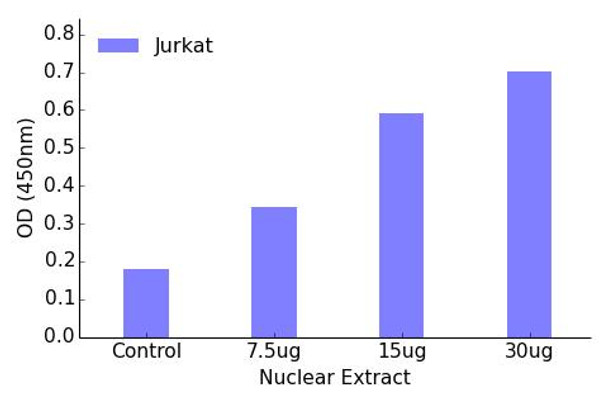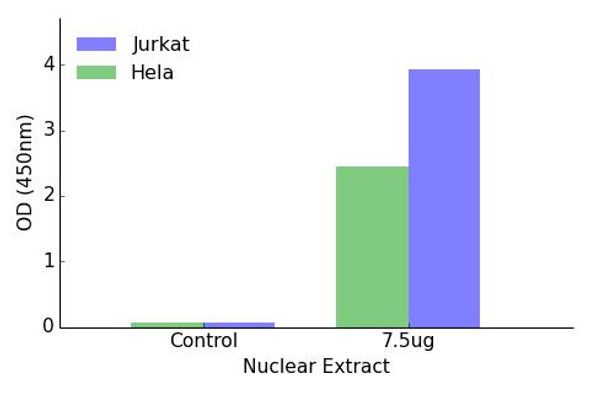Description
GATA4 Transcription Factor Activity Assay
The GATA4 Transcription Factor Activity Assay Kit is specifically designed to measure the activity of the GATA4 transcription factor in biological samples. With its high sensitivity and specificity, this kit allows for accurate and reproducible results, making it an ideal tool for studying the role of GATA4 in various biological processes.GATA4 is a key transcription factor that plays a critical role in cardiac development, as well as in the regulation of genes involved in cell proliferation, differentiation, and apoptosis.
Dysregulation of GATA4 has been associated with various diseases, including heart defects and certain types of cancer, making it a valuable target for research and drug development.Whether you are studying the molecular mechanisms underlying cardiac development or exploring the potential therapeutic applications of targeting GATA4, the GATA4 Transcription Factor Activity Assay Kit provides a reliable and convenient solution for your research needs.
| Product Name: | GATA4 Transcription Factor Activity Assay |
| Product Code: | TFAB00116 |
| Target: | GATA4 |
| Synonyms: | GATA-binding factor 4 |
| Reactivity: | Human, Mouse |
| Sample Types: | Nuclear or cell lysates |
The Assay Genie GATA4 transcription factor activity assay allows for the detection and qualitative analysis of endogenous levels of activated transcription factors in a variety of nuclear and cell lysates
Assay Genie ELISA kits are designed to significantly reduce experiment time and ensure sensitivity and flexibility for high-throughput screening.
| Assay Time: | 4.5 hours |
| Detection Method: | Colorimetric 450 nm |
| Size: | 12 x 8-Well Microstrips |
| Storage: | 4°C for 6 months |
| UniProt Protein Function: | GATA4: a conserved and ubiquitous member of the GATA family of zinc-finger transcription factors. Members of this family recognize the GATA motif which is present in the promoters of many genes. This protein is thought to regulate genes involved in embryogenesis and in myocardial differentiation and function. May regulate a set of cardiac-specific genes and play a crucial role in cardiogenesis. Defects are a cause of atrial septal defect 2 (ASD2). ASD2 is an autosomal dominant condition with atrial septal defect and other congenital heart disease but no conduction defects or noncardiac abnormalities. |
| UniProt Protein Details: | Protein type:Motility/polarity/chemotaxis; Transcription factor Chromosomal Location of Human Ortholog: 8p23.1-p22 Cellular Component: nucleoplasm; nucleus Molecular Function:chromatin binding; DNA binding; protein binding; sequence-specific DNA binding; transcription activator binding; transcription coactivator activity; transcription factor activity; transcription factor binding Biological Process: anatomical structure formation; blood coagulation; cell development; cell fate commitment; cell-cell signaling; embryonic foregut morphogenesis; embryonic heart tube anterior/posterior pattern formation; endoderm development; heart looping; male gonad development; positive regulation of angiogenesis; positive regulation of cardioblast differentiation; positive regulation of transcription from RNA polymerase II promoter; positive regulation of transcription, DNA-dependent; regulation of transcription, DNA-dependent; response to drug; transcription from RNA polymerase II promoter Disease: Atrial Septal Defect 2; Atrioventricular Septal Defect 4; Testicular Anomalies With Or Without Congenital Heart Disease; Tetralogy Of Fallot; Ventricular Septal Defect 1 |
| NCBI Summary: | This gene encodes a member of the GATA family of zinc-finger transcription factors. Members of this family recognize the GATA motif which is present in the promoters of many genes. This protein is thought to regulate genes involved in embryogenesis and in myocardial differentiation and function, and is necessary for normal testicular development. Mutations in this gene have been associated with cardiac septal defects. Additionally, alterations in gene expression have been associated with several cancer types. Alternative splicing results in multiple transcript variants. [provided by RefSeq, Apr 2015] |
| UniProt Code: | P43694 |
| NCBI GenInfo Identifier: | 215274105 |
| NCBI Gene ID: | 2626 |
| NCBI Accession: | P43694.2 |
| UniProt Secondary Accession: | P43694,Q3MJ45, Q5IFM8, B7ZKX0, B7ZKZ4, |
| UniProt Related Accession: | P43694 |
| Molecular Weight: | 44,665 Da |
| NCBI Full Name: | Transcription factor GATA-4 |
| NCBI Synonym Full Names: | GATA binding protein 4 |
| NCBI Official Symbol: | GATA4 |
| NCBI Official Synonym Symbols: | TOF; ASD2; VSD1; TACHD |
| NCBI Protein Information: | transcription factor GATA-4 |
| UniProt Protein Name: | Transcription factor GATA-4 |
| UniProt Synonym Protein Names: | GATA-binding factor 4 |
| Protein Family: | GATA transcription factor |
| UniProt Gene Name: | GATA4 |
| UniProt Entry Name: | GATA4_HUMAN |






